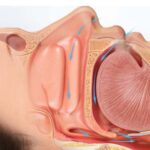
Shares in Sanofi have come under pressure as it reported the results of a trial of atopic dermatitis (AD) candidate amlitelimab that met all objectives – but seem to have disappointed investors.
The stock was down more than 10% at the time of writing, even though data from the phase 3 COAST 1 trial of anti-OX40L antibody amlitelimab showed statistically significant improvements in skin clearance and disease severity compared to placebo in adults and adolescents with AD, also known as eczema.
Amlitelimab has been billed by Sanofi as a successor to its Regeneron-partnered, $14.5 billion blockbuster Dupixent (dupilumab), approved across a range of inflammatory conditions, and is being developed for an even broader range of indications.
In COAST 1, amlitelimab given once a month achieved clear or almost clear skin in 21.1% of patients aged 12 years and older with moderate-to-severe AD at 24 weeks using the vIGA-AD 0/1 scale, compared to 9.2% of the placebo group. A 12-weekly dose performed just as well, with that objective reached in 22.5% of patients at that time point.
The picture was the same in a secondary primary endpoint, the proportion of patients seeing 75% skin clearance or better using the EASI-75 scale. With monthly dosing, that endpoint was reached in 35.9% of patients, compared to 19.1% of those on placebo, while with 12-weekly dosing the rate rose to 39.1%.
While the results were clearly positive, there seemed to be concern that the clinical profile of amlitelimab was not improving much on Dupixent, raising questions about its commercial potential, despite having the potential to be dosed just four times a year. Dupixent is currently dosed once every two or four weeks, depending on the indication.
Dupixent is such a big seller – accounting for more than a third of Sanofi’s sales at the moment – that investors are concerned the company will struggle to weather the impact of competition when its patents expire without some big new products like amlitelimab to counter the inevitable sales decline.
Sanofi has called amlitelimab a ‘pipeline-in-a-product’, one of three in its portfolio – alongside anti-CD40L antibody frexalimab and orally-active TNF blocker SAR441566 – that it is hoping will help generate around $11 billion in annual sales by the end of the decade.
According to the company’s head of R&D, Houman Ashrafian, the COAST 1 data back up amlitelimab’s credentials as a drug that can normalise and overactive immune system without depleting T cells and undermining immunity.
“These promising data seen in a study population that more closely resembles today’s diverse patient landscape, including a substantial proportion previously treated with advanced therapies, support our ambition to deliver a differentiated medicine,” he said.
Investors may also be casting an eye at Amgen’s rival anti-OX40L candidate rocatinlimab, which generated positive phase 3 results in the HORIZON trial last year with EASI-75 figures that were numerically higher than seen with Sanofi’s drug – albeit without any head-to-head comparison. The 32.8% EASI-75 response with rocatinlimab versus 13.7% for placebo also seemed to disappoint investors and analysts.
Sanofi, meanwhile, has advanced amlitelimab into a phase 3 programme for asthma – even though it missed the mark in a midstage trial – while other studies are on the go in hidradenitis suppurativa (HS), systemic sclerosis, coeliac disease, and alopecia.









